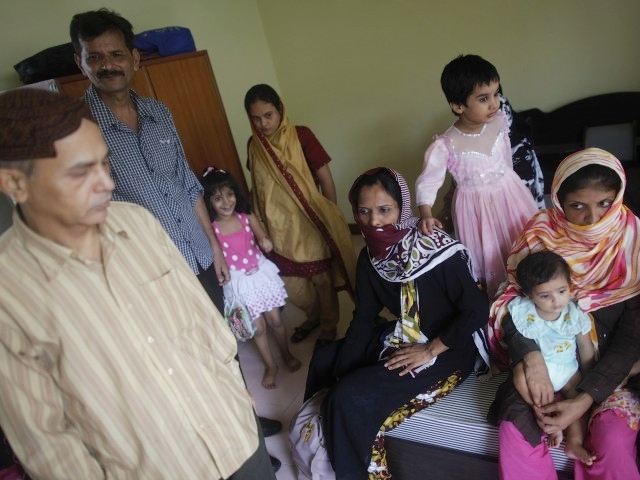Pakistan |
Detained in Thailand: Almost 100 Pakistani refugees released
Published: June 7, 2011
 The refugees, all members of the Ahmadi community, had been in detention for more than six months. PHOTO: REUTERS |
BANGKOK: Almost 100 Pakistani refugees were freed on Monday from Bangkok’s overcrowded immigration prison in an initiative spearheaded by Thai human rights activists, the Associated Press (AP) reported.
The Thai Committee for Refugees said the release on bail of 96 members of Pakistan’s Ahmadiyya community was the first such large-scale release of refugees who Thai authorities treat as “illegal aliens”, according to AP.
The group negotiated the release with the state National Human Rights Commission and immigration officials.
The detainees, about a third of whom are children, were arrested last December even though all but two were granted official refugee status by the United Nations.
“We are feeling very happy … like a bird in a cage when it comes out,” said Mehnood, a freed 35-year-old refugee who declined to give his last name, as quoted by AP.
The committee said conditions in the detention centre had been described as “overcrowded, inhumane and unhygienic,” with more than 150 people having to share cells designed for 30 to 40 people.
“In the women’s cell there were times when some women had to stand so that others could sleep,” said co-coordinator of the Asia Pacific Refugee Rights Network Anoop Sukumaran.
“The children were often sleeping next to the toilets, which were overflowing with feces and urine. The conditions, to say the least, were horrific at some points.”
Thailand attracts thousands of refugees each year because it is easily accessible by land and sea, and borders several countries that are politically repressive and economically weaker.
It has generally been welcoming to refugees, especially when they have been fleeing warfare in neighbouring countries such as Cambodia and Myanmar. In recent years, however, it has taken a harder line toward groups such as the Hmong from Laos and Rohingya from Myanmar, whom they see as economic migrants.
Published in The Express Tribune, June 7th, 2011.
The Thai Committee for Refugees said the release on bail of 96 members of Pakistan’s Ahmadiyya community was the first such large-scale release of refugees who Thai authorities treat as “illegal aliens”, according to AP.
The group negotiated the release with the state National Human Rights Commission and immigration officials.
The detainees, about a third of whom are children, were arrested last December even though all but two were granted official refugee status by the United Nations.
“We are feeling very happy … like a bird in a cage when it comes out,” said Mehnood, a freed 35-year-old refugee who declined to give his last name, as quoted by AP.
The committee said conditions in the detention centre had been described as “overcrowded, inhumane and unhygienic,” with more than 150 people having to share cells designed for 30 to 40 people.
“In the women’s cell there were times when some women had to stand so that others could sleep,” said co-coordinator of the Asia Pacific Refugee Rights Network Anoop Sukumaran.
“The children were often sleeping next to the toilets, which were overflowing with feces and urine. The conditions, to say the least, were horrific at some points.”
Thailand attracts thousands of refugees each year because it is easily accessible by land and sea, and borders several countries that are politically repressive and economically weaker.
It has generally been welcoming to refugees, especially when they have been fleeing warfare in neighbouring countries such as Cambodia and Myanmar. In recent years, however, it has taken a harder line toward groups such as the Hmong from Laos and Rohingya from Myanmar, whom they see as economic migrants.
Published in The Express Tribune, June 7th, 2011.









